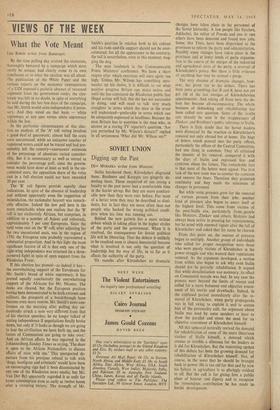VIEWS OF THE WEEK
What the Vote Meant
LEO BARON writes from Bulawayo:
By the time polling day arrived the electorate, thoroughly bemused by a campaign which must surely be unique, had clearly come to its own conclusion as to what the election was all about. The publication of the White Paper and the various reports on the economic consequences of a UDI exposed a pathetic absence of reasoned argument from the government ranks; the elec- torate was left in no doubt, in spite of everything he said during the last few days of the campaign, that Mr. Smith would seize independence if neces- sary. And they voted on that basis — white supremacy at any cost versus white supremacy within the law.
In the particular circumstances of this elec- tion an analysis of the 'A' roll voting involves a good deal of guesswork; almost half the scats were uncontested, while an unknown number of registered voters could not be traced and had pre- sumably left the country—canvassers' estimates of the percentage of absentees varied consider- ably. But it is unnecessary as well as unreal to consider the percentage poll; since the govern- ment would have done at least as well in the un- contested seats, the opposition share of the votes cast in a full election could not have exceeded 20 per cent.
The 'B' roll figures provide equally clear indications. In spite of the absence of leadership and without apparently even the suggestion of intimidation, the nationalist boycott was remark- ably effective. Indeed the low poll here is the more remarkable when one realises that the 'B' roll is not exclusively African, but comprises, in addition to a number of Asians and coloureds, approximately 5 per cent Europeans. Since the total votes cast on the 'B' roll, after adjusting for the two uncontested seats, was in the region of 1750, the European vote probably represented a substantial proportion. And in this light the most significant feature of all is that only one of the right-wing independents was returned (in a three- cornered fight) in spite of open support from the Rhodesian Front.
If this election has proved—as indeed it has— the overwhelming support of the Europeans for Mr. Smith's brand of white supremacy, it has proved equally conclusively the overwhelming support of the Africans for Mr. Nkomo. The decks are cleared, but the European position having been demonstrated to be both extreme and militant, the prospects of a breakthrough have become even more remote. Mr. Smith's news con- ference on the morning after polling day un• doubtedly struck a note very different from that of his election speeches; he no longer talked of seizing independence if negotiations finally broke down, but only if 'it looks as though we are going to lose the civilisation we have built up, and the forces of Communism are going to take over.' And on African affairs he was reported in the Johannesburg Sunday Times as saying, 'The door is open to the African Nationalists to discuss affairs of state with me.' This unexpected de- parture from his previous refusal to talk with 'thugs, hooligans and criminals' would have been an encouraging sign had it been disseminated by any one of the Rhodesian news media; but Mr. Van Der Byl apparently regarded it as unfit for home consumption even as early as twelve hours after a sweeping victory. The strength of Mr.
Smith's position in relation both to his cabinet and his rank-and-file support should not be over- estimated; for all the appearance to the contrary, the tail is nevertheless, even at this moment, wag- ging the dog.
The next landmark is the Commonwealth Prime Ministers' conference. We have a short respite after which emotions will once again run high. Unless. Mr. Wilson has something spec- tacular up his sleeve, it is difficult to see what positive progress Britain can make unless and until she has convinced the Rhodesian public that illegal action will fail; this she has not succeeded in doing. and will need to talk very much straighter in terms which the man in the street will understand—preferably in terms which can be adequately expressed in headlines. Because the man Britain has to convince is the man who, in answer to a roving TV reporter's question, 'Are you perturbed by Mr. Wilson's threats?' replied in all seriousness 'What did Mr. Wilson say?'


































 Previous page
Previous page